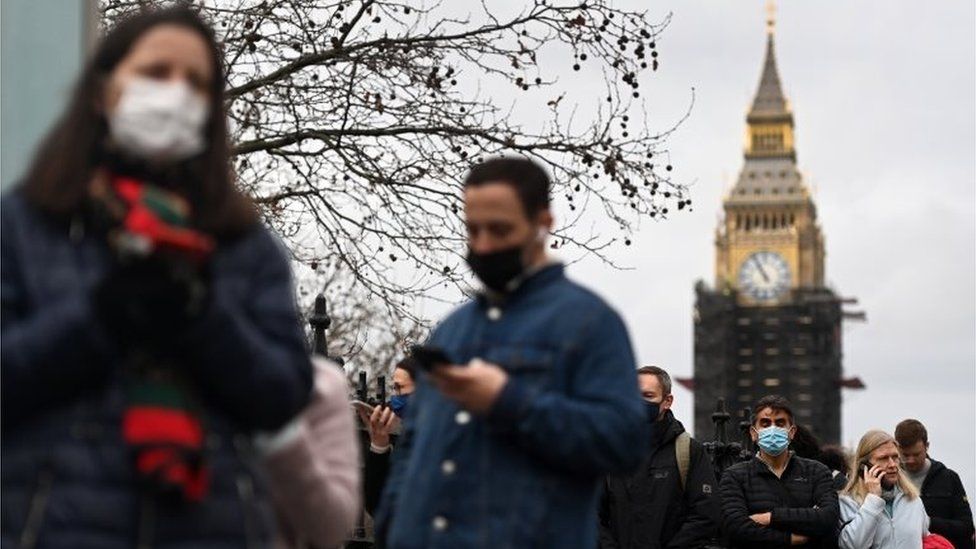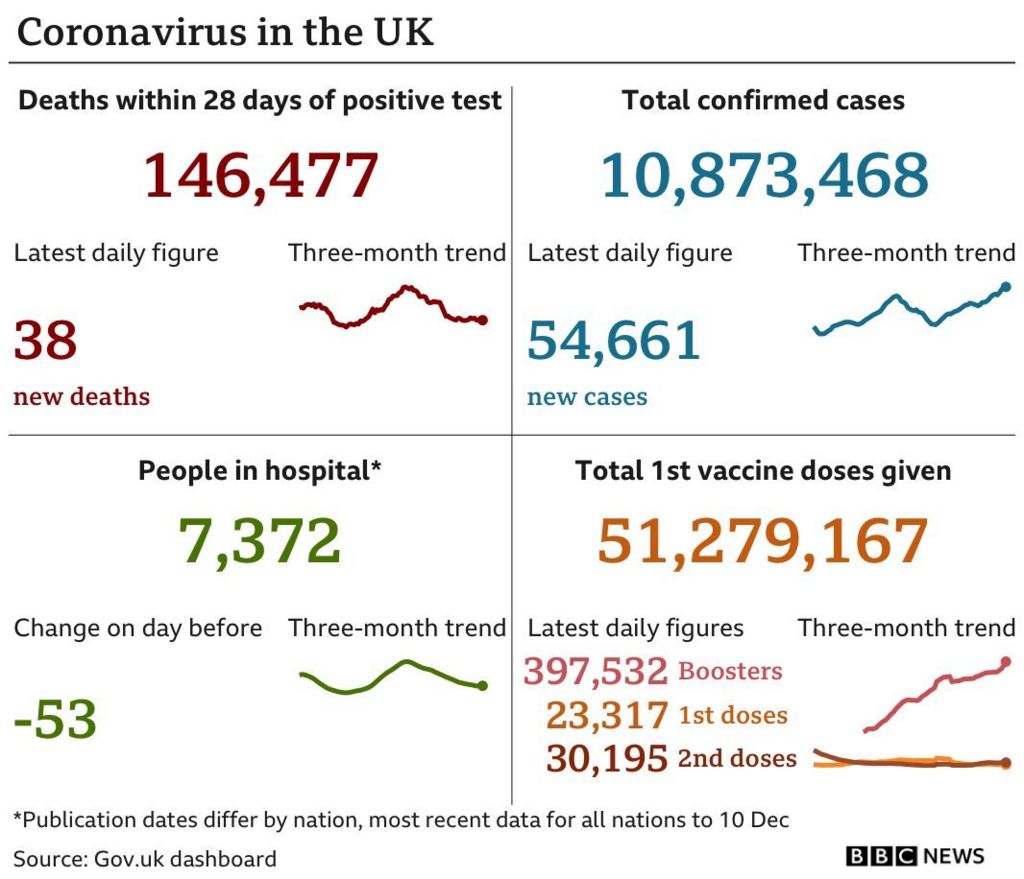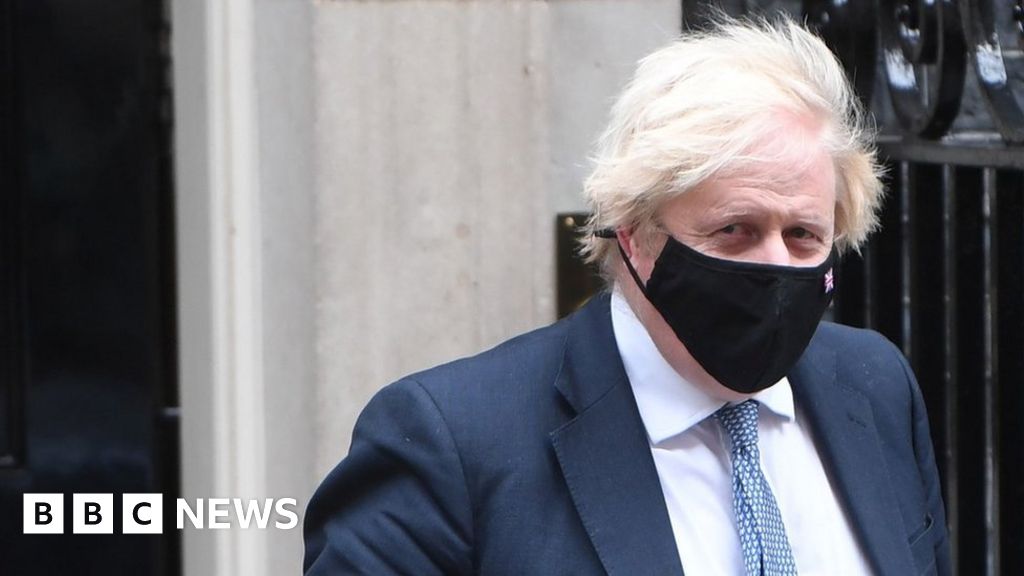
Boris Johnson is facing his biggest backbench rebellion since the 2019 general election when MPs vote on new Covid rules for England later.
Around 70 Conservatives are expected to vote against plans to introduce mandatory Covid passes to enter large venues such as nightclubs.
The PM calls them a sensible response to rising Omicron cases – but the plan has sparked civil liberties concerns.
The measure is still likely to pass, as Labour plans to vote for them.
It would mean that from Wednesday, people will have to prove they are fully vaccinated or have a negative lateral flow test to enter large venues.
In a series of votes in the House of Commons on Tuesday afternoon, MPs will also vote on:
- A new regulation making it compulsory to wear a face covering in most indoor settings, except for pubs and restaurants
- A measure allowing fully-vaccinated people who have been exposed to a positive Covid case to avoid self-isolation if they take daily lateral flow tests, and receive a negative result
- Making it compulsory for frontline NHS and social care staff to be fully vaccinated from April 2022
Deputy Prime Minister Dominic Raab told the BBC he hoped the measures would mean “we go into this Christmas in a very different position to last year” and “people can feel reassured” about the their festive plans.
He added that the new Covid passes were not “an unreasonable thing” to ask of people to enter large venues, adding: “I would do it voluntarily.”
‘Balanced and proportionate’
The Covid pass measure has proved controversial on the government’s own benches, with one Conservative MP, Marcus Fysh, telling the BBC it was “the thin end of an authoritarian wedge”.
Another Conservative, Andrea Leadsom, said one of her constituents was now “now less afraid of Covid than she is of intrusive and incoherent government regulations”.
Mr Johnson sought to reassure his colleagues, describing the measures as “balanced and proportionate”, but added there was “no room for complacency”.
The BBC estimates around 70 Conservative MPs are expected to vote against the introduction of Covid passes, which would be the biggest backbench rebellion against the prime minister since he won a Commons majority at the 2019 election.
Tory rebellions on the other measures are likely to be smaller.

Big rebellion would hit Johnson’s authority

Ministers have tried to soften the ranks of Tory rebels. In the Commons on Monday the Health Secretary Sajid Javid pointed out Plan B contains very limited restrictions compared to measures in force across Europe.
He implored backbenchers to believe Covid certification to enter certain venues did not amount to a “Covid passport”. But in spite of these assurances – and the prime minister warning of a “tidal wave of infections” – the potential Conservative revolt could be the biggest of Boris Johnson’s premiership.
While the government and Labour see the Plan B measures as necessary to protect public health, dozens of Conservatives view them as a step too far. An infringement on liberty. A slippery slope. A slide towards a future Plan C and further restrictions.
If 70 or more Tory MPs do ignore Conservative whips tomorrow and either vote against or abstain, it could make No 10 very wary about introducing further measures in the new year.
For Boris Johnson, relying on Labour votes to get his plan through Parliament would be galling and a sign of how grouchy backbench Conservative MPs are with their beleaguered leader. His authority would take another hit.

There was some confusion earlier, however, over the number of Omicron cases confirmed in UK hospitals.
Mr Raab told Sky News there were 250 such cases, then revised that number down to nine when speaking to the BBC. The UK Health Security Agency then revealed the actual number was 10.
On Monday, Health Secretary Sajid Javid told MPs the Omicron variant now represented 20% of cases in England – and was expected to become the dominant variant in London within 48 hours.
He said the UK Health Security Agency had estimated the current number of daily infections was around 200,000, and he warned that hospitalisations and deaths would “dramatically increase” in the next few days and weeks.
The UK reported 54,661 confirmed cases of all Covid variants on Monday, with 38 deaths. The most recent figures show 7,373 people in hospital with Covid across the country.


Labour leader Sir Keir Starmer said it was his party’s “patriotic duty” to ensure the new rules went through.
By approving the government’s plans, he said his party was “supporting the NHS and supporting our country” but added “rest assured, I will still hold the government to account in the coming weeks – that is also in the national interest”.
He said the government should use the Christmas break to get children aged over 12 vaccinated to stop coronavirus spreading in schools.
Meanwhile, Liberal Democrat MP Daisy Cooper told the BBC her party would vote for the new rules on masks, but against the introduction of coronavirus passes.
Covid passes are already used in Scotland, Wales, and Northern Ireland for nightclubs and large events.
In Scotland, the leader of the Conservatives Douglas Ross has questioned the scheme’s effectiveness.


- WILL FUTURE WARS BE FOUGHT ENTIRELY BY MACHINES? Stuart Russell discusses the role of AI in conflicts
- THE WEDDING DETECTIVES: Just two photos lead to a story of infidelity and murder

